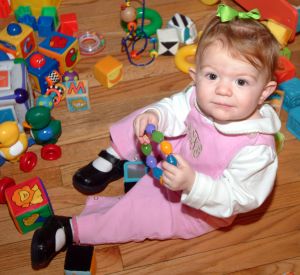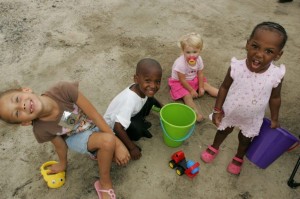Parents and caregivers often ask what young children need to know before kindergarten; this is the fourth in a series of blog posts on kindergarten readiness and early learning basics. No matter the age of your little one, this will give you a general picture of what to do as your child’s very first teacher.
One of the most important responsibilities for parents and caregivers is to ensure that children have time and space to PLAY. Did you know that play is so essential to the healthy development of children that the United Nations High Commission has enshrined the right to play as one of the Universal Rights of the Child?
 Why is play so significant? Quite simply, because play is how a child learns. The activity does not matter; it could be building with blocks, cuddling a stuffie, putting together a puzzle or throwing stones in a puddle. It could even be washing the dishes or putting away the groceries. If a child is eager and having fun, creating, discovering and manipulating, this is play. Through play, children connect their inner and outer worlds, increasing their knowledge and understanding and gaining confidence in themselves.
Why is play so significant? Quite simply, because play is how a child learns. The activity does not matter; it could be building with blocks, cuddling a stuffie, putting together a puzzle or throwing stones in a puddle. It could even be washing the dishes or putting away the groceries. If a child is eager and having fun, creating, discovering and manipulating, this is play. Through play, children connect their inner and outer worlds, increasing their knowledge and understanding and gaining confidence in themselves.
There is a tendency to dismiss play and say that it is not really learning, but if you could take a Magic School Bus field trip in a child’s brain during play, there would be all kinds of connections, growth, development and activity happening as that brains learns. On a recent radio show for Learn and Play with Mrs. A, we did just that and explored play and learning.
 Children will learn many basic and readiness skills as they play. It can occur in any room in the house and at any time of the day, alone or with others. Play does not need fancy toys or programs to occur. Kids will play with sticks and empty boxes, the sandwich containers in the kitchen drawer and things that give parents grey hairs.
Children will learn many basic and readiness skills as they play. It can occur in any room in the house and at any time of the day, alone or with others. Play does not need fancy toys or programs to occur. Kids will play with sticks and empty boxes, the sandwich containers in the kitchen drawer and things that give parents grey hairs.
Development for children at this age is tremendously important. At no other point in their lives will brains have such a sensitive time for learning. Parents and caregivers are children’s first teachers and home is the first school. But there’s no reason for parents to panic. Nature, in it’s wisdom has determined that the most powerful tool for children to learn is PLAY! Imagine that. Now that’s planning! A critical time for development could be a problem if the answer wasn’t CHILD’S PLAY. Does your child’s day have time for play?
